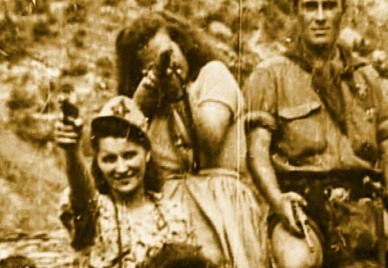24-25 April 2015 | Birkbeck College, University of London
Supported by The Wellcome Trust and The Birkbeck Institute of the Humanities
 In the aftermath of WW2, the narrative of widespread anti-fascist resistance became the true foundational myth of both Eastern and Western Europe, and the memory of the resistance came to constitute the core element in national identities and post-war legitimation of European states. However, the experiences of actual resistance soldiers at the end and in the immediate aftermath of the war were complex and multi-layered, and quite often far from celebratory and victorious.
In the aftermath of WW2, the narrative of widespread anti-fascist resistance became the true foundational myth of both Eastern and Western Europe, and the memory of the resistance came to constitute the core element in national identities and post-war legitimation of European states. However, the experiences of actual resistance soldiers at the end and in the immediate aftermath of the war were complex and multi-layered, and quite often far from celebratory and victorious.
This conference will tell a much-neglected transnational European story of experiences of WW2 resistance, and address the mismatch between resistance soldiers expectations and their post-war socio-political realities. While historians of European resistance have primarily addressed the theme in isolated national contexts, this conference will explore the striking commonalities in veterans experiences across the divided European continent: why was it that resistance soldiers and veterans in so many different political settings, and both East and West of the Iron Curtain, reported a similar feeling of neglect, misunderstanding and betrayal? How can we explain the similarities in the way in which different European countries dealt with their resisters and veterans, and appropriated the narratives and memories of the resistance? The conference will thus cross the traditional boundaries of European historiography, and draw comparisons between the Soviet Union, East and Central Europe, and Western Europe. By including the Soviet Union in a broader European historical narrative, the conference will explore to what extent veterans’ experiences as well as associations cut across Cold War fault lines. Among other themes, the conference will advance our understanding of the history of soldier physical and psychological trauma in the context of post-war social and cultural history and memory. It will examine the issue of veterans’ reactions to states attempts at appropriating or sanitizing the memory of the resistance, and veterans’ ability to influence national politics; internationalism of veterans’ organizations; veterans’ conceptualizations of justice, retribution and reconciliation; as well as everyday experiences of resistance soldiers in post-war societies and (both harmonious and fraught) relationships between different veterans’ associations.
Programme
Friday, 24 April 2015
9:15 – 9:45 Welcome and introductory remarks
- Ana Antic, Birkbeck
9:45 – 12:00 Resisters imagine the post-war world: Hopefulness and disappointment as a pan-European experience
- Anita Prazmowska, LSE: “Planning for post-war Poland: Conflicts within the resistance movements during the Second World War”
- Roderick Bailey, Oxford: “Pride, Anger and Anguish: Views of Postwar Europe among Veterans of Britain’s Special Operations Executive”
- Mason Norton, Edge Hill University: “The French Resistance & the ‘European Project’- Friends or Foes?”
- Samuel Kruizinga, University of Amsterdam: “Rehabilitation in Resistance. Spanish Civil War Veterans in the Communist Resistance Movement in the Netherlands”
- Discussant: Jessica Reinisch, Birkbeck
12:00 – 13:00 Lunch
13:00 – 15:00 Conflicts over victimhood: Defining war trauma
- Ben Zajicek, Towson University: “Psychiatry and the Medical Consequences of the Great Patriotic War in the USSR, 1944-1953”
- Ralf Futselaar, NIOD: “For the unhappy few. The demographics of resistance and the political epidemiology of PTSD in Denmark, Norway and the Netherlands, 1945-1975”
- Maria Teresa Brancaccio, University of Maastricht: “The politics of war trauma in Italy”
- Ben Shephard, Bristol: “Culture, politics or biology? Some thoughts on American PTSD and European War trauma”
15:00 – 15:30 Tea and coffee break
15:30 – 17:30 Clashes with post-war states: Heroes in disgrace
- Pieter Lagrou, University of Brussels: “The long shadow of torture. Silence and suspicion in resistance narratives”
- Robert Dale, Nottingham Trent University: “Demobilizing Leningrad’s Heroes and the Meaning of Fighting Fascism”
- Ana Antic, Birkbeck: “Heroes in chains: Yugoslav resistance veterans in post-war ‘re-education’ prisons, 1949-1956”
- Discussant: Richard Bessel, University of York
18:00-19:30 Round-table discussion: Homecomings in the twentieth century: War veterans between re-integration and pathology (Malet Street building, room 421)
- Richard Bessel, University of York
- Daniel Pick, Birkbeck
- Jessica Reinisch, Birkbeck
- Ben Shephard, Bristol
- Samuel Kruizinga, University of Amsterdam
20:00 Conference dinner
Saturday, 25 April 2015
9:30 – 11.30 Alternatives to the resistance: Waffen-SS, German veterans and experiences from the other side
- Svenja Goltermann, University of Zurich: “Fighting with the past, struggling with the future. Wehrmacht Veterans in post-war West Germany”
- Mark Edele, University of Western Australia: “Deserters: Why, When, and How Stalin’s Soldiers Crossed the Frontline, 1941-1945”
- Martin Gutmann: “‘Peace is hell’: the experience, memory, prosecution, and legacy of foreign Waffen-SS volunteers in the postwar period”
- Discussant: Ben H. Shepherd, Glasgow Caledonian University
11:30-12:00 Tea and coffee break
12:00-14:00 Re-inventing resistance: Constructing narratives of anti-fascism in the aftermath of the war
- Jelena Batinic, Stanford University: “Remembering the Partizanka: War, Memory, and the State in the Yugoslav Lands”
- Robert Gildea, Oxford University: “Resisters’ accounts and dominant narratives in France after the Second World War”
- Kenneth Slepyan, Transylvanian University: “Narratives of Reunion: Soviet Partisans Remember their Return to the Soviet ‘Mainland’”
- Discussant: Marius Turda, Oxford Brookes
